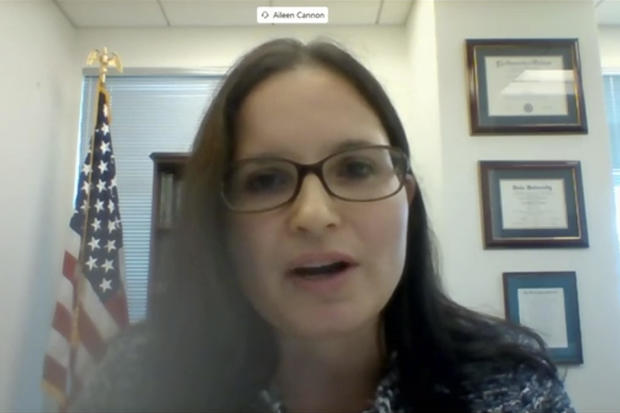Federal judge in Trump case has limited track record in criminal cases, hews closely to DOJ sentencing recommendations
A woman named Jennifer was smoking a cigarette in her car, trying to stay warm during her lunch break outside a health care facility where she worked in Avon Park, Florida, in February 2022.
What happened next, she later recalled, would change her life "drastically for the worst."
"The next thing I know, you're standing [by] my driver's seat with a gun pointed at me asking for my keys, my phone and money, and threatening to shoot me if I didn't give it to you," Jennifer said as she addressed her assailant, Artavis Spivey, in court during his sentencing hearing last November. "Because of your selfish actions that day, I was left to deal with the consequences."
Spivey, of Highlands County, and a co-defendant stole Jennifer's car and crashed it during a police pursuit several hours later. They both pleaded guilty to federal charges for the violent, armed carjacking, and Spivey was facing the prospect of more than 15 years in prison. Jennifer, whose last name was withheld from some court records, testified that she suffered trauma and financial hurdles after the attack.
Justice Department prosecutors sought a sentence of 180 months in prison, or 15 years, arguing Spivey's "conduct was egregious, serious, and significant, and demonstrates a blatant disregard for the safety of others." Defense attorneys asked for a more lenient sentence of roughly 147 months, arguing that Spivey had a troubled upbringing with an imprisoned father, and had lived on the streets since he was 12 after dropping out of middle school.
U.S. District Court Judge Aileen Cannon handed down a sentence for Spivey that was much closer to what federal prosecutors sought: 175 months in prison. Cannon noted Spivey's challenging upbringing and family life, but said she was "unfortunately presented with a very disturbing picture of someone who through their actions has demonstrated himself to be a real danger to the community, who needs to be deterred from continuing to commit crimes at the expense of the community."
The case went largely unnoticed, other than a fleeting press release from the U.S. Attorney's Office in Florida after the sentences for Spivey and a co-defendant were handed down.
However, the case is notable for being one of a small subset of federal criminal cases handled by Cannon, who is now overseeing the case of United States v. Trump, the first ever federal criminal prosecution of a former president. Cannon, who was nominated by Donald Trump, was confirmed to her seat on the bench in the West Palm Beach division of the Southern District of Florida federal court in November 2020.
Trump is charged with retaining dozens of highly classified documents at his Palm Beach home of Mar-a-Lago and allegedly obstructing the government's efforts to get them back. He has pleaded not guilty and claims the prosecution is politically motivated.
If Trump is convicted, Cannon would be responsible for handing down any sentence. Federal judges typically have wide discretion when imposing sentences, though they often take into account recommendations by prosecutors and defense attorneys.
A CBS News review of a half dozen of Cannon's recent criminal cases shows she has taken a harder line on criminal defendants and hewed closely to federal prosecutors' sentencing recommendations in cases involving violence or child exploitation. She has even exceeded those recommendations for some defendants.
Cannon's record on criminal cases
In a May 2023 case involving fentanyl trafficking, Cannon handed down a sentence that was more than four years longer than the sentence recommended by federal prosecutors. The case is now under appeal in the U.S. Circuit Court of Appeals for the 11th District, a defense attorney involved told CBS News.
In February, Cannon also imposed a stiffer sentence than recommended by prosecutors in the case of Nicholas Sorgenfrey, a Port St. Lucie man who pleaded guilty to possessing child exploitation images. Sorgenfrey was also accused of trying to hide his phone in a paper bag in a bedroom closet when SWAT team members arrived at his home for a search. Cannon sentenced Sorgenfrey to 144 months in prison, exceeding the prosecution's recommendation of 119 months.
In a firearms and narcotics case, Cannon sentenced Lance Reterree, 44, to approximately 11 years in prison, just one year less than the sentence recommended by the Justice Department. At sentencing, prosecutors noted Reterree had 13 prior felony convictions. "To say that Ratterree has led a life of crime would be an understatement," one assistant U.S. attorney told Cannon.
The CBS News review of Cannon's recent criminal cases also found she showed more leniency in two recent nonviolent white-collar fraud cases.
She handed down a 27-month prison sentence, six months less than 33 months recommended by prosecutors, in the case of Daniel Bouaziz, who pleaded guilty to money laundering in a counterfeit art scheme out of his Palm Beach County art gallery. Prosecutors said he "laundered money he received from a victim to whom he had sold counterfeit art, to include pieces purportedly by Andy Warhol."
In a September 2022 case, Cannon issued a sentence of 32 months in prison for Juan Guillermo Gonzalez, a Miami-area business owner accused of defrauding government agencies. The sentence was nearly 25% shorter than the one recommended by prosecutors, who accused Gonzalez of "obtaining information from U.S. departments and agencies and improperly using it for commercial advantage and private financial gain."
According to federal court documents, in arguing for leniency, Gonzalez's attorney said the defendant is "a brilliant and accomplished mathematician and engineer" who "moved to the United States on a scholarship to attend the University of Delaware and obtained his Ph.D." The defense emphasized his purported "extraordinary ability" and the benefit he would bring to the United States," according to court filings from the Justice Department.
The cases offer only a limited glimpse into Cannon's brief tenure and her handling of criminal cases. Catherine Ross, a law professor at George Washington University, said Cannon's record is too short to be able to detect a pattern that might indicate how she could determine a sentence in the Trump case.
Cannon's lack of a lengthy record on complex criminal cases has been a source of criticism since her assignment to the Trump criminal case. Trump's case involves alleged criminal misconduct with classified records, some of which will require a formal review under the Classified Information Procedures Act. Cannon has already ordered a classified procedures review for July 14.
In her small set of criminal cases, Cannon has drawn mixed reviews from defense attorneys. An attorney for Christopher Bauer, the defendant who pleaded guilty to possession with intent to distribute in the fentanyl trafficking case, is appealing Cannon's sentence of 180 months in prison, which was 50 months longer than recommended by federal prosecutors. "The appellate court will determine if the sentence is procedurally or substantively unreasonable," Bauer's attorney told CBS News. "I am, of course, taking the position on appeal that Judge Cannon's sentence was unreasonable under both criteria."
Defense attorney Valentin Rodriguez, who handled the case of Artavis Spivey, the man who pleaded guilty to carjacking the woman named Jennifer, lauded Cannon's handling of the case.
"Judge Cannon listened to all of the arguments made by both sides, as well as the victim and my client's mother," Rodriguez told CBS News. "She understood the dilemma. I could ask for no more from a federal judge."





